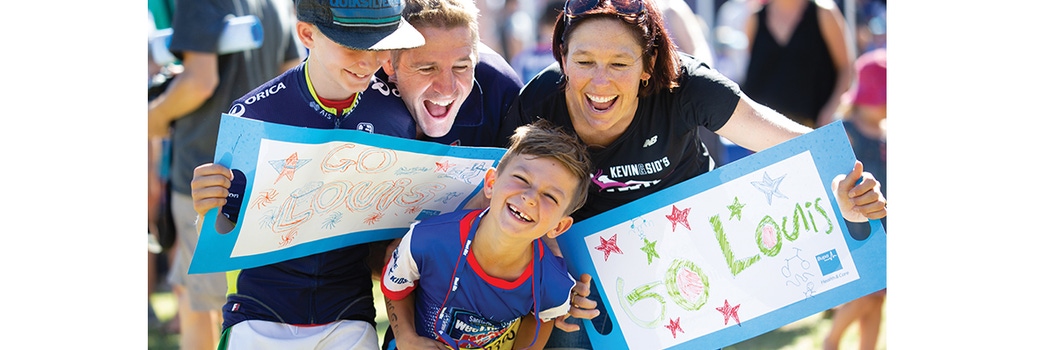- Bennett, C et al. 2018. Little People, Big Lives: Foundations for healthy Australian children in the 21st century. University of Notre Dame Sydney. Available online: [link]
- https://blackdoginstitute.org.au/docs/default-source/research/evidence-and-policy-section/2017-youth-mental-health-report_mission-australia-and-black-dog-institute.pdf?sfvrsn=6
- YouGovGalaxy. Data on file. 2018.

Giving your child a healthy sense of self
It goes without saying that the most important foundation for any growing child is to feel loved and cared for by their family.
We all love our children and do everything in our power to keep them safe, secure and nurture in them a sense of belonging. Love forms the basis of positive relationships and for the development of confident, happy children.1
Many decades of research show that love and care, especially in the early years of life, positively shapes a child’s development.
Emotional resilience is one of the biggest issues affecting young people today. Research from The Black Dog Institute found that mental illnesses (such as anxiety and depression) are on the rise among young Australians, affecting one in four kids.2
A contributing factor to emotional resilience is self-esteem. In 2022, the Weet-Bix Feed Their Belief Report found 1 in 5 Australian students already report negative self-esteem as they enter high school and that the incidence of negative self-esteem increases as children progress through their teenage years.
While low self-esteem limits the ability of a child to face new challenges and recover from life’s inevitable setbacks, it also limits a child’s ability to learn, grow and develop. In fact, a 2018 YouGov Galaxy survey of parents in Australia found that almost half (49%) observed that their kids don’t perform as well in school when they are not feeling happy in themselves.3
While our kids know we love them no matter what, one of the most important life skills we can teach them is learning self-love.
Children learn about ‘self’ through their interactions with others. When children feel emotionally supported in loving relationships, they become more confident and develop a healthy sense of self that they take into adulthood.1
This has a real impact on everything from their interactions and relationships with others, to their ability to excel at school and develop an interest in the world around them.
Keep reading for some ways you can help build a positive and strong sense of self-worth in your child. For more practical tips from Dr Justin Coulson, parenting expert and author of ‘9 Ways to a Resilient Child’, click here to download the Weet-Bix Feed Their Belief Report.
When kids take failures or mistakes too much to heart, it creates a “negative attention bias” (paying too much attention to negative things, and not enough attention to positive things). 1
To help kids develop a positive attitude towards themselves, the key is to focus on acknowledging their strengths and helping them to deal with failure in a healthy way. 1
Make a point of focusing on their efforts and achievements even when they don’t “succeed”.
If a child dwells too much on mistakes they made or how they weren’t “the best” at something, counteract that thought-pattern as quickly as possible. Point out what valuable lessons they gained from having tried and how fantastic their efforts were.
For example, if your child entered a science experiment competition but didn’t win, point out all the cool new skills they learned just by completing the project — skills that will only get better over time. Remind them what fun they had creating the project and how it’s still an achievement even if they didn’t “win” something.
Similarly, if they do win, congratulate them on their achievements but try focusing your praise on their efforts, rather than directly praising the fact that they won or came first.
This will help them learn to cultivate a sense of confidence in themselves that they can always improve, rather than form a habit of perfectionism or validation through winning alone.
Well into their early teens, kids continue to mould themselves on the behaviours they observe in their parents and carers and this shapes their outlook on life as adults.1
Parents can foster positive ‘self-talk’ in their kids by openly acknowledging their own successes and strengths.1
Exhibiting adaptive and pro-social behaviours in front of children can help them to learn skills such as working through a challenging task without getting upset, taking pride in their achievements and using humour and reflection when things don’t turn out as they hoped.1
And while it isn’t always easy, don’t forget to make time for yourself!
Going for a walk outside or sitting in quiet reflection when things get frustrating shows kids how to be adaptive when dealing with difficult or challenging situations, and encourages mindfulness, self-understanding and emotional intelligence.1
Spending quality time as a family unit is essential, but research from University of Notre Dame shows that children also need time to be physically and emotionally close to their caregivers on a one-on-one basis.1
Your child may openly express different concerns or worries when they are alone with you - things they might not want to talk about in front of the whole family. That one-on-one time is valuable for identifying any problems they may be having at school or any worries they have, providing a safe space for you to work through solutions with them.
Why not try organising a special day out or a “date night” with each one individually?
Centre the activities on something you know they love, but they wouldn’t normally get a chance to do as a whole family.
Another easy way to squeeze in that extra bit of individual time is to stagger each child’s bedtime routine by 15 or 30 minutes, so they each get alone time with mum and dad before bed.
Learn more about importance of creating a strong sense of love and belonging in children by downloading the Little People Big Lives report.
We all love our children and do everything in our power to keep them safe, secure and nurture in them a sense of belonging. Love forms the basis of positive relationships and for the development of confident, happy children.1
Many decades of research show that love and care, especially in the early years of life, positively shapes a child’s development.
Emotional resilience is one of the biggest issues affecting young people today. Research from The Black Dog Institute found that mental illnesses (such as anxiety and depression) are on the rise among young Australians, affecting one in four kids.2
A contributing factor to emotional resilience is self-esteem. In 2022, the Weet-Bix Feed Their Belief Report found 1 in 5 Australian students already report negative self-esteem as they enter high school and that the incidence of negative self-esteem increases as children progress through their teenage years.
While low self-esteem limits the ability of a child to face new challenges and recover from life’s inevitable setbacks, it also limits a child’s ability to learn, grow and develop. In fact, a 2018 YouGov Galaxy survey of parents in Australia found that almost half (49%) observed that their kids don’t perform as well in school when they are not feeling happy in themselves.3
While our kids know we love them no matter what, one of the most important life skills we can teach them is learning self-love.
Children learn about ‘self’ through their interactions with others. When children feel emotionally supported in loving relationships, they become more confident and develop a healthy sense of self that they take into adulthood.1
This has a real impact on everything from their interactions and relationships with others, to their ability to excel at school and develop an interest in the world around them.
Keep reading for some ways you can help build a positive and strong sense of self-worth in your child. For more practical tips from Dr Justin Coulson, parenting expert and author of ‘9 Ways to a Resilient Child’, click here to download the Weet-Bix Feed Their Belief Report.
1. Go from strength to strength
Finding children’s strengths and encouraging a positive attitude about life helps draw the child’s focus to their own strengths and the good things around them. 1When kids take failures or mistakes too much to heart, it creates a “negative attention bias” (paying too much attention to negative things, and not enough attention to positive things). 1
To help kids develop a positive attitude towards themselves, the key is to focus on acknowledging their strengths and helping them to deal with failure in a healthy way. 1
Make a point of focusing on their efforts and achievements even when they don’t “succeed”.
If a child dwells too much on mistakes they made or how they weren’t “the best” at something, counteract that thought-pattern as quickly as possible. Point out what valuable lessons they gained from having tried and how fantastic their efforts were.
For example, if your child entered a science experiment competition but didn’t win, point out all the cool new skills they learned just by completing the project — skills that will only get better over time. Remind them what fun they had creating the project and how it’s still an achievement even if they didn’t “win” something.
Similarly, if they do win, congratulate them on their achievements but try focusing your praise on their efforts, rather than directly praising the fact that they won or came first.
This will help them learn to cultivate a sense of confidence in themselves that they can always improve, rather than form a habit of perfectionism or validation through winning alone.
2. Be the behaviour you want to see
From the minute they are born, children learn about how to behave in the world by mimicking their parents.Well into their early teens, kids continue to mould themselves on the behaviours they observe in their parents and carers and this shapes their outlook on life as adults.1
Parents can foster positive ‘self-talk’ in their kids by openly acknowledging their own successes and strengths.1
Exhibiting adaptive and pro-social behaviours in front of children can help them to learn skills such as working through a challenging task without getting upset, taking pride in their achievements and using humour and reflection when things don’t turn out as they hoped.1
And while it isn’t always easy, don’t forget to make time for yourself!
Going for a walk outside or sitting in quiet reflection when things get frustrating shows kids how to be adaptive when dealing with difficult or challenging situations, and encourages mindfulness, self-understanding and emotional intelligence.1
3. Make one on one time
As our families grow and we juggle more activities, it can get more challenging to dedicate one-on-one time with our kids individually.Spending quality time as a family unit is essential, but research from University of Notre Dame shows that children also need time to be physically and emotionally close to their caregivers on a one-on-one basis.1
Your child may openly express different concerns or worries when they are alone with you - things they might not want to talk about in front of the whole family. That one-on-one time is valuable for identifying any problems they may be having at school or any worries they have, providing a safe space for you to work through solutions with them.
Why not try organising a special day out or a “date night” with each one individually?
Centre the activities on something you know they love, but they wouldn’t normally get a chance to do as a whole family.
Another easy way to squeeze in that extra bit of individual time is to stagger each child’s bedtime routine by 15 or 30 minutes, so they each get alone time with mum and dad before bed.
Learn more about importance of creating a strong sense of love and belonging in children by downloading the Little People Big Lives report.
More in

The latest nutrition advice, plus health and wellness tips delivered to your inbox monthly



